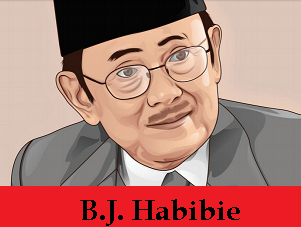Kembali bertemu dengan kami dalam pembahasan Materi Bahasa Inggris Chapter 10 – B.J. Habibie. pada materi kali ini kita akan belajar vokal, kosakata, pengucapan kalimat dan membaca. materi ini juga kami sertakan juga contoh soalnya sebagai evaluasi hasil belajar.

Materi Bahasa Inggris Chapter 10 – B.J. Habibie
Berikut ini adalah beberapa informasi Materi Bahasa Inggris Chapter 10 – B.J. Habibie yang kami rangkum untuk anda.
B.J. HABIBIE
Bacharuddin Jusuf Habibie known as BJ.
Habibie was born on 25 June 1936. He was the
Third President of the Republic of Indonesia
(1998–1999). Habibie was born in Parepare,
South Sulawesi Province to Alwi Abdul Jalil
Habibie and R.A. Tuti Marini Puspowardojo.
His father was an agriculturist from Gorontalo
of Bugis descent and his mother was a Javanese
noblewoman from Yogyakarta. His parents
met while studying in Bogor. When he was 14
years old, Habibie’s father died.
Following his father’s death, Habibie
continued his studies in Jakarta and then in
1955 moved to Germany. In 1960, Habibie
received a degree in engineering in Germany,
giving him the title Diplom-Ingenieur.He remained in Germany as a research assistant under Hans Ebner at the Lehrstuhl
und Institut für Leichtbau, RWTH Aachen to conduct research for his doctoral
degree.
In 1962, Habibie returned to Indonesia for three months on sick leave.
During this time, he was reacquainted with Hasri Ainun, the daughter of R.
Mohamad Besari. The two married on 12 May 1962, returning to Germany shortly
afterwards. Habibie and his wife settled in Aachen for a short period before moving
to Oberforstbach. In May 1963 they had their first son, Ilham Akbar Habibie, and
later another son, Thareq Kemal Habibie.
When Habibie’s minimum wage salary forced him into part-time work, he
found employment with the Automotive Marque Talbot, where he became an
advisor. Habibie worked on two projects which received funding from Deutsche
Bundesbahn. Due to his work with Makosh, the head of train constructions offered
his position to Habibie upon his retirement three years later, but Habibie refused.
Habibie did accept a position with Messerschmitt-Bölkow-Blohm in
Hamburg. There, he developed theories on thermodynamics, construction, and
aerodynamics known as the Habibie Factor, Habibie Theorem, and Habibie
Method, respectively. He worked for Messerschmit on the development of the
Airbus A-300B aircraft. In 1974, he was promoted to vice president of the company.
In 1974, Suharto requested Habibie to return to Indonesia as part of Suharto’s
drive to develop the country. Habibie initially served as a special assistant to Ibnu
Sutowo, the CEO of the state oil company Pertamina. Two years later, in 1976,
Habibie was made Chief Executive Officer of the new state-owned enterprise
Industri Pesawat Terbang Nusantara (IPTN). In 1978, he was appointed as Minister
of Research and Technology. Habibie was elected vice president in March 1998.
On 21 May 1998, Suharto publicly announced his resignation and Habibie was
immediately sworn in as president. Habibie’s government stabilized the economy
in the face of the Asian financial crisis and the chaos of the last few months of
Suharto’s presidency.
Since relinquishing the presidency, Habibie has spent more time in Germany
than in Indonesia. However, he has also been active as a presidential adviser
during Susilo Bambang Yudoyono’s presidency. In September 2006, he released
a book called Detik-Detik Yang Menentukan: Jalan Panjang Indonesia Menuju
Demokrasi (Decisive Moments: Indonesia’s Long Road Towards Democracy). The
book recalled the events of May 1998.
Task 1:
Form Completion
Fill in the blanks with information about B.J. Habibie mentioned in the
reading text.

Task 2:
Comprehension Questions
Answer the following questions by referring to the reading text about
B.J. Habibie.
VOCABULARY EXERCISE
Complete the following sentences using the words below.
resignation relinquishing sick leave
descent respectively release
settled in retirement sworn in reacquainted
1. He traces his _____________ from Yogya palace.
2. She is coming here on a ____________ She will come back to the company
when she is recovered.
3. They were classmates when they were in senior high school. Now, after ten
years of separation, they are now ______________in Bandung.
4. After getting married, the young couple ___________ Minneapolis.
5. English and Arabic courses are held in Room 10 and 11 _________________
6. After his ___________, the company faces a complicated problem.
7. He was only seventeen when he was _____________ as King of Marcalaca.
8. ______________ her position as the CEO of the oil company, she mostly spend her time in New Zealand.
9. They will ____________ a new album by the end of this year to mark their
25th anniversary.
VOCABULARY EXERCISE
TEXT STRUCTURE
Recounts are used to tell about past events. Remember that a recount
consist of orientation (opening), a series of events, and reorientation (closing).
Individually, complete the following chart to find out the structure of the
biographical recount of B.J. Habibie.

GRAMMAR REVIEW
Observe the italicized verbs in the following sentences in the
left and the right columns. What’s the difference?


SPEAKING
Internet someone who has
made a difference (e.g., Mother
Theresa, Thomas Alva Edison,
Albert Einstein, Habibie, etc.).
When you have chosen the
figure, use the plan to develop
your notes.

WRITING
Independent Writing
biography as a reference,
write a biographical
recount about your idol.
Use your notes on the
speaking activities to help
you write.
